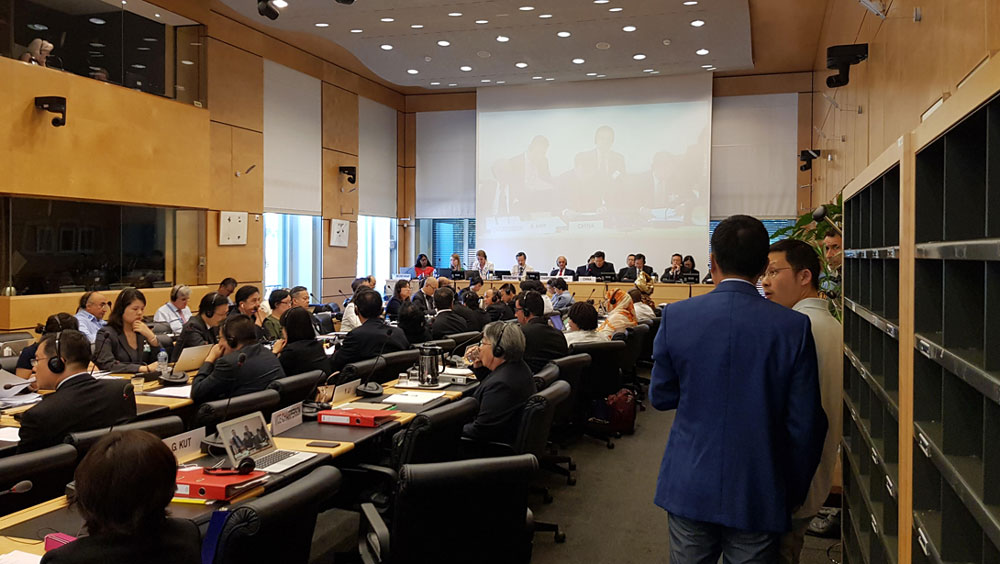Xinjiang in the spotlight at forthcoming UN hearing

Today, from 10 a.m. – 1 p.m. Geneva time (4 a.m. – 7 a.m. EST, or starting 4 p.m. China time), the United Nations Committee on the Elimination of Racial Discrimination (CERD) will meet to “consider periodic reports” received from several countries, including China. This is the second and final day of China’s hearing.
On Friday August 10, Gay McDougall, vice-chair of CERD, condemned China’s massive social engineering program in Xinjiang that has seen perhaps more than a million Uyghurs disappeared into “re-education camps” as part of an apparent plan to destroy Uyghur culture. There were 29 civil society organizations that submitted reports about China. Some of these were from Chinese government-controlled organizations that echoed the Communist Party line, but most of the reports were critical.
The Beijing delegation (comprising 48 people, including Yu Jianhua 俞建华, the P.R.C.’s UN ambassador in Geneva) is expected to answer these charges during Monday’s session. This is how you can follow the proceedings:
- Details of the schedule and participants are on the UN website. (If you’re a The China Project Access member, you can find direct download links to the relevant documents in Friday’s newsletter.)
- Follow the Twitter hashtags #ChinaCERD and #CERD, or Sarah Brooks of the International Service for Human Rights.
- Watch the UN live stream — I don’t have the exact URL for the CERD hearing, but you may be able to find it by searching the webtv.un.org website.
- The latest reporting on Xinjiang by the Globe and Mail’s Nathan VanderKlippe, who has been one of the journalists recently focusing on Xinjiang, is here: Exporting persecution: Uyghur diaspora haunted by anxiety, guilt as family held in Chinese camps. The Washington Post’s Emily Rauhala is also covering the story closely; see New evidence emerges of China forcing Muslims into “reeducation” camps.
- We’ve also been closely following developments in the region.
Sinica Podcast: Gerry Shih on China’s Uyghur Muslims, under pressure at home and abroad
What will the Beijing delegation say in answer to the various charges of massive human rights abuses? I suspect the substance of their argument will be almost exactly the same as this article from the English website of the People’s Daily-owned nationalist rag Global Times: Protecting peace, stability is top of human rights agenda for Xinjiang.
The security situation in Xinjiang has been turned around recently and terror threats spreading from there to other provinces of China are also being eliminated. Peaceful and stable life has been witnessed again in all of Xinjiang.
This achievement has come at a price that is being shouldered by people of all ethnicities in Xinjiang.
If you don’t want to read the whole thing, this is how the Global Times tweeted out the article:

Is the West getting China wrong?
In today’s Access member’s newsletter (subscribe here) we’ll have a story about Taiwanese gangster and Communist Party supporter “White Wolf” Chang An-lo 张安乐, by John Pomfret. John is a longtime China foreign correspondent, author of books about matters Chinese, and occasional The China Project contributor.
As it happens, John tweeted about a subject unrelated to the White Wolf today:
This is an important contribution to the ever-growing field of China watching and a reminder that the ever-growing number of "experts" on China routinely get it wrong. https://t.co/mlNU5RbwbG
— John Pomfret 潘文 (@JEPomfret) August 12, 2018
In response, Robert Kapp — longtime scholar of Chinese relations and occasional business-government heavyweight in U.S.-China relations — tweeted:
https://twitter.com/twerpsichore/status/1028735033039773696
They were talking about a piece by William H. Overholt — senior fellow at Harvard University’s Asia Center and longtime advisor to the public and private sectors: The West is getting China wrong. Excerpt:
China has not escaped the pressures of political complexity that forced political reform elsewhere. Rather, those pressures are so powerful that the whole structure of Xi Jinping’s administration is a reaction to those pressures.
…
Xi is vulnerable. He disappears from the media for days. An adulatory movie is suddenly curtailed. Portraits are suddenly removed. His bodyguards are suddenly changed. Lawyers and students are increasingly assertive. The annual Beidahe leadership meeting is contentious.
This is the opposite of an omnipotent president for life running an economy inexorably destined for rapid growth. US policies based on that false premise lead Washington to declare defeat for its policy of engagement, declare China a fearsome national security enemy and launch desperate economic warfare against the presumed superior economic prospects of China’s politicised economy. Sad.






